
The South African Republic, also known as the Transvaal Republic, was an independent Boer republic in Southern Africa which existed from 1852 to 1902, when it was annexed into the British Empire as a result of the Second Boer War.
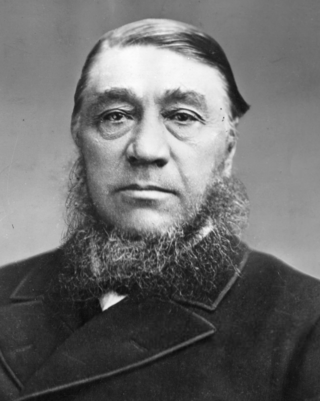
Stephanus Johannes Paulus Kruger, better known as Paul Kruger, was a South African politician. He was one of the dominant political and military figures in 19th-century South Africa, and State President of the South African Republic from 1883 to 1900. Nicknamed Oom Paul, he came to international prominence as the face of the Boer cause—that of the Transvaal and its neighbour the Orange Free State—against Britain during the Second Boer War of 1899–1902. He has been called a personification of Afrikanerdom, and remains a controversial figure; admirers venerate him as a tragic folk hero.
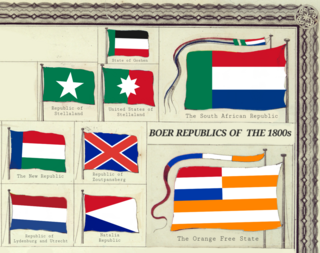
The Boer republics were independent, self-governing republics formed by Dutch-speaking inhabitants of the Cape Colony and their descendants. The founders – variously named Trekboers, Boers and Voortrekkers – settled mainly in the middle, northern, north-eastern and eastern parts of present-day South Africa. Two of the Boer republics achieved international recognition and complete independence: the South African Republic and the Orange Free State. The republics did not provide for the separation of church and state, initially allowing only the Dutch Reformed Church, and later also other Protestant churches in the Calvinist tradition. The republics came to an end after the Second Boer War of 1899–1902, which resulted in British annexation and later incorporation of their lands into the Union of South Africa.
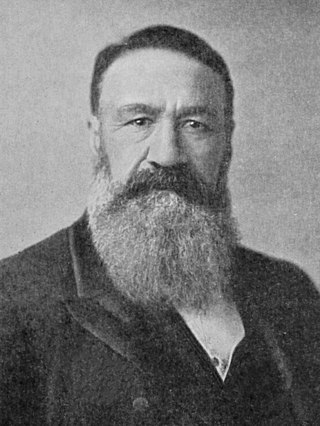
Petrus Jacobus Joubert, better known as Piet Joubert, was Commandant-General of the South African Republic from 1880 to 1900. He also served as Vice-President to Paul Kruger from May 1883 to October 1884 and from May 1896 until his death. He served in First Boer War, Second Boer War, and the Malaboch War.
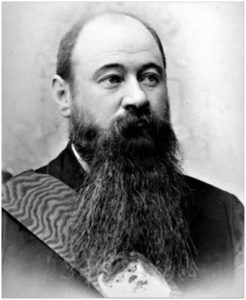
MartinusTheunis Steyn was a South African lawyer, politician, and statesman. He was the sixth and last president of the independent Orange Free State from 1896 to 1902.

The Volksraad of the South African Republic was the parliament of the former South African Republic (ZAR), it existed from 1840 to 1877, and from 1881 to 1902 in part of what is now South Africa. The body ceased to exist after the British Empire's victory in the Second Anglo-Boer War. The Volksraad sat in session in Ou Raadsaal in Church Square, Pretoria.
The Netherlands–South African Railway Company or NZASM was a railway company established in 1887. The company was based in Amsterdam and Pretoria, and operated in the South African Republic (ZAR) during the late 19th century. At the request of ZAR president Paul Kruger, the NZASM constructed a railway line between Pretoria and Lourenço Marques in Portuguese East Africa.
The following lists events that happened during 1894 in South Africa.
The following lists events that happened during 1890 in South Africa.

Francis William Reitz, Jr. was a South African lawyer, politician, statesman, publicist, and poet who was a member of parliament of the Cape Colony, Chief Justice and fifth State President of the Orange Free State, State Secretary of the South African Republic at the time of the Second Boer War, and the first president of the Senate of the Union of South Africa.

The State Artillery Regiment is a reserve artillery regiment of the South African Army.
The coins of the South African pound were part of the physical form of South Africa's historical currency, the South African pound. Prior to the Union of 1910, various authorities issued their own pounds, some as independent entities. After the Union but before 1923, coins in circulation were mostly British, but the coins of Paul Kruger's South African Republic remained in circulation. In 1923, South Africa began to issue its own coins, adopting coins that were identical in size and value to those used in Great Britain: 12 pence (12d) = 1 shilling (1s), and 20s = 1 pound (£1). On 14 February 1961, the Union of South Africa adopted a decimal currency, replacing the pound with the Rand.

The State President of the South African Republic had the executive authority in the South African Republic. According to the constitution of 1871, executive power was vested in the President, who was responsible to the Volksraad. The President was elected for a term of five years and was eligible for re-election. The President had to be Burgher and also qualified to vote for the First Volksraad elections, over 30 years old, a member of a Protestant church, and never convicted of a dishonourable offence.

Schalk Willem Burger was a South African military leader, lawyer, politician, and statesman who was acting president of the South African Republic from 1900 to 1902, whilst Paul Kruger was in exile. At the age of 21, Burger worked as a clerk in the office of the field coronet. He married his wife, Alida Claudina de Villiers, during this time.
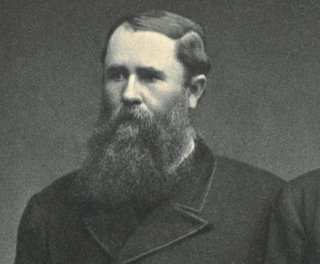
Nicolaas Jacobus Smit was a Boer general and politician. During the First Boer War, he led Boer forces to victory during the Battle of Majuba Hill. He served as Vice State President of the South African Republic from 1887 and served until his death.

In the Colonies and Boer Republics which became the Union of South Africa in 1910, several unofficial military decorations and medals were instituted and awarded during the nineteenth and early twentieth century. The Johannesburg Vrijwilliger Corps Medal is an unofficial private campaign medal which was instituted in 1899 by Lieutenant Colonel S.H. van Diggelen, the founder and Commanding Officer of the Johannesburg Vrijwilliger Corps, for award to the officers and men of his unit.

The South African Republic, which existed from 1852 to 1877, 1881 to 1902, and 1914 to 1915, used two flags: (1) the so-called 'Vierkleur' from 1857 to 1874, and again from 1875 to 1877 and 1881 to 1902, and (2) the so-called 'Burgers Flag' from 1874 to 1875. They were superseded by the flag of Transvaal. The Vierkleur was also used by the South African Republic declared in 1914 during the Maritz Rebellion, which lasted into February 1915.

Ewald Auguste Esselen was a South African barrister who served as State Attorney of the South African Republic from 1894 to 1895.

Lucas Johannes Meyer, was a Boer general, member of the Transvaal government and president of the Nieuwe Republiek.
Cornelis Johannes Bodenstein was a former member of the executive council and Vice State President of the South African Republic and president of the parliament, Volksraad.


















